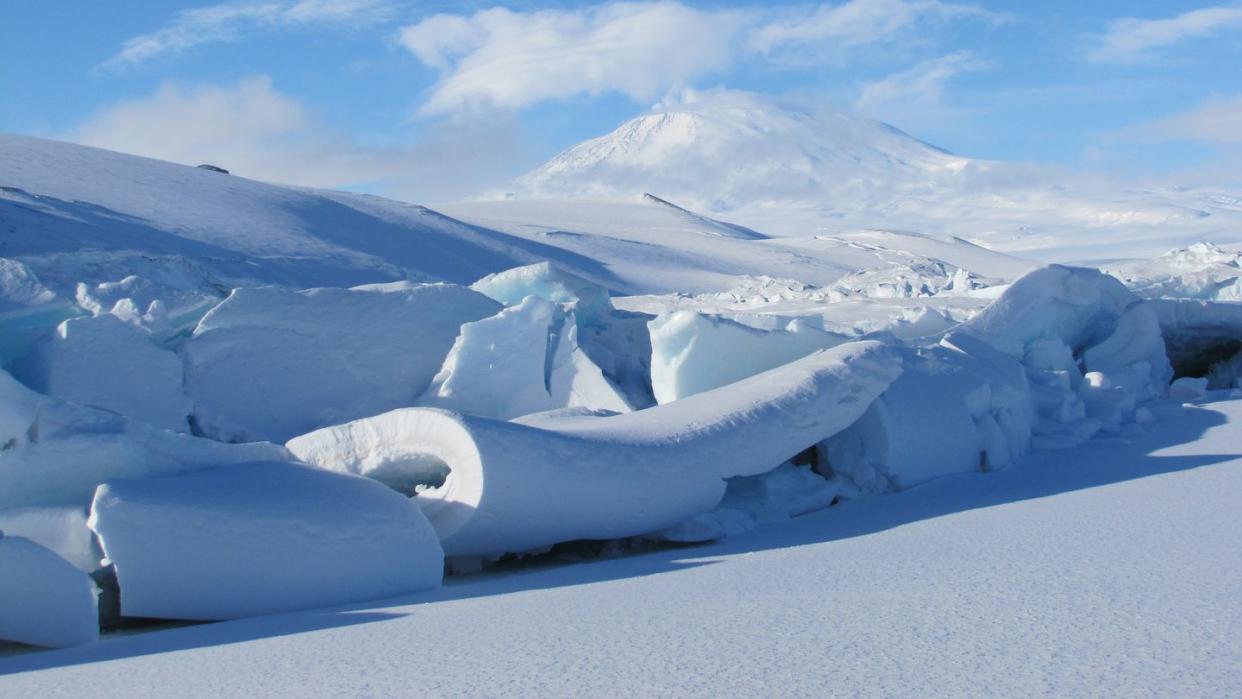An Ice Body the Size of France Is Mysteriously Shifting Every Day. No One Knows Why.

"Hearst Magazines and Yahoo may earn commission or revenue on some items through these links."
The Ross Ice Shelf is the largest chunk of ice on Antarctica, at roughly the size of France.
Scientists have known that ice streams have a tendency to lurch at least once a day with the tides, but a new study could show that this mysterious “stickiness” moves the entire Ross Ice Shelf by an astonishing 6 centimeters once or twice a day.
It’s important to understand these movements, as ice streams can cause icequakes and fractures throughout the frozen continent.
The geologic motions of the Earth happen at soul-crushingly slow speeds. The tectonic plates, for example, only shift on average some 0.6 inches every year, Mount Everest will put on a measly 4mm of height in 2024, and the Grand Canyon formed one-quarter of one-thousandths of a foot a year over the course of some 20 million years. So, yeah, the Earth can be pretty slow going.
But a new study from scientists at the Washington University in St. Louis shows that, every once in a while, our planet is capable of putting a little pep in its step.
Although Antarctica appears as an ice-encased footnote at the bottom of most maps, the landmass is actually very large—1.5 times the size of the U.S. The largest slab of ice on that frozen continent is the Ross Ice Shelf, clocking in at around 188,000 square miles and several hundred meters thick. And surging with the Ross Ice Shelf is the 60-mile-wide Whillans Ice Stream, named after the American glaciologist Ian Whillans and his groundbreaking research into these moving belts of ice.
One of the interesting properties of the Whillans Ice Stream is that it undergoes a tidal-induced stick-slip cycle, in which this stream suddenly slides forward at high tide and midway into falling tide. Scientists at Washington University recently discovered that the power behind this particular stick-slip motion—similar to the motion occurring before and during an earthquake—actually moves the entire Ross Ice Shelf (which is largely the size of France) some 6 centimeters once or twice a day. Although that may not seem like much when marking it off with a ruler, it’s an incredible amount compared to movement over Earth’s usual geologic timescales. The results of the study were published last week in the journal Geophysical Research Letters.
“One would not detect the movement just by feeling it. The movement occurs over a time period of several minutes, so it is not perceptible without instrumentation. That’s why the movement has not been detected until now” Washington University’s Doug Wiens, an environmental and planetary sciences professor and lead author, said in a press statement. “These sudden movements could potentially play a role in triggering icequakes and fractures in the ice shelf.”
This stick-slip motion is caused by part of the ice stream remain stationary while the rest of the ice moves forward. Eventually—once or twice per day — the large section lurches forward to make up for lost time. This jerking movement of the Whillans Ice Sheet is well-known, but scientists didn’t realize that this particular ice stream was moving the entire Ross Ice Shelf in the process.
Ice streams are incredibly important, as they act like arteries for the Antarctic Ice Shelf by discharging 90 percent of its ice and sediment out into the oceans. While the researchers haven’t connected the effects of human-induced climate change to this lurching ice stream behavior, one theory (according to the scientists) is that loss of water in the Whillans Ice Stream is making it more “sticky.” And while icequakes and fractures are just a part of life on the Ross Ice Shelf, this massive chunk of ice did completely disintegrate some 120,000 years ago during Earth’s last interglacial period.
For now, the Ross Ice Shelf shows no signs of cracking up—but one or two daily lurches is to be expected.
You Might Also Like

